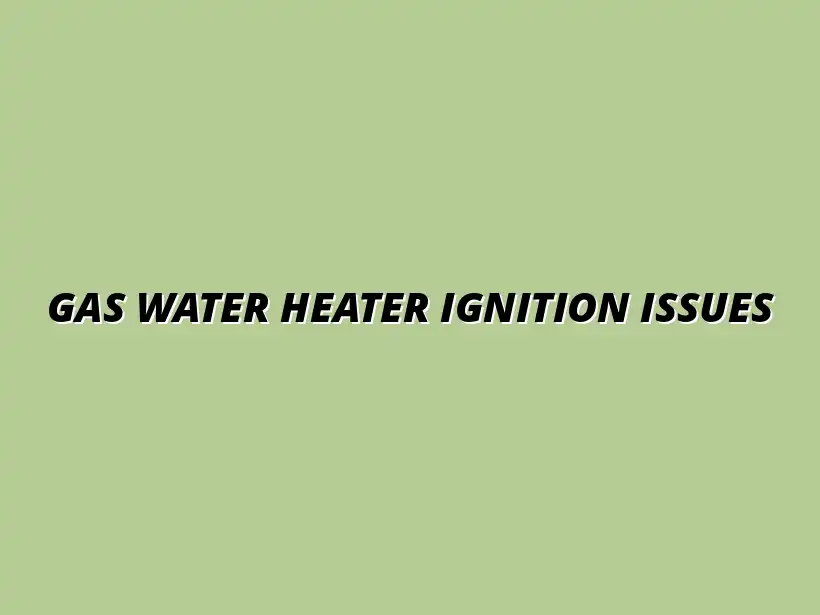
Gas Water Heater Ignition Issues
Understanding Gas Water Heater Ignition Mechanisms
Gas water heaters are essential appliances that provide hot water for various household needs. Understanding how these systems work, especially their ignition mechanisms, is key to troubleshooting any potential problems. In this section, I’ll dive into the functions of gas water heaters, the components involved in ignition, and some common issues you might encounter.
Overview of Gas Water Heater Functions
The primary function of a gas water heater is to heat water for daily activities like bathing, cooking, and cleaning. The system uses natural gas or propane to ignite a burner that heats the water stored in a tank. By understanding how these heaters operate, we can identify problems that might disrupt their functionality. If you're experiencing issues with your water heater, you might find helpful advice on fixing a water heater that won't start.
How Gas Water Heaters Operate Efficiently
Gas water heaters operate by drawing cold water into a tank, which is then heated by a flame from the burner located at the bottom. The heated water rises to the top of the tank to be used when needed. This process repeats as the cold water enters the tank, ensuring a steady supply of hot water.
To maintain efficiency, modern gas water heaters are often equipped with insulation to minimize heat loss and a thermostat to regulate temperature. This helps in not just saving energy but also in ensuring that you have hot water available whenever you need it! For more tips on maintaining your water heater, check out this guide on maintaining your gas water heater.
Components Involved in the Ignition Process
The ignition process of a gas water heater relies on several critical components: the pilot light, thermocouple, gas valve, and igniter. Each of these parts plays a unique role in ensuring that the burner ignites properly.
- Pilot Light: A small flame that ignites the gas from the burner.
- Thermocouple: A safety device that detects whether the pilot light is lit.
- Gas Valve: Controls the flow of gas to the burner.
- Igniter: An electronic component that creates a spark to ignite the gas.
Understanding these components can help you diagnose any ignition issues that may arise. Each piece works together to create the hot water supply necessary for your home. If your pilot light is giving you trouble, fixing a water heater pilot light can be a straightforward process.
Identifying Common Gas Water Heater Ignition Problems
When it comes to gas water heaters, ignition problems can be common and frustrating. Identifying the signs of these issues early can help prevent further damage and ensure you have hot water when you need it. In this section, I’ll cover the signs of ignition failure and some common reasons these issues occur.
Signs of Ignition Failure in Gas Water Heaters
Recognizing the signs of ignition failure can be vital in addressing issues before they worsen. Here are some common indicators to look out for:
- Fluctuating Water Temperature: If your water temperature varies, it might indicate ignition problems.
- Failure to Heat: No hot water can suggest that the burner isn’t igniting.
- Frequent Pilot Light Outages: If your pilot light frequently goes out, it can be a sign of thermocouple issues.
Unusual Noises and Their Implications
Unusual noises coming from your gas water heater can also signal ignition or operational issues. Here are some sounds to pay attention to:
- Hissing: This could indicate a gas leak. Addressing a gas leak quickly is crucial; for information on dealing with a burst pipe (which can sometimes be related to gas line issues), see this resource.
- Rumbling or Boiling: Often means sediment build-up on the burner.
- Clicking: Indicates that the igniter is trying to spark but may not be successful.
Listening to your water heater and noting any strange noises can help in diagnosing the root of the problem!
Indicators of Insufficient Heating
Another critical sign of ignition problems is insufficient heating. If you notice:
- Slow Recovery Time: It takes longer for the water to heat up after use.
- Inconsistent Heat Output: The water fluctuates between hot and cold.
- Cold Water Supply: No hot water at all can signal that the ignition mechanism isn’t functioning properly.
These indicators can point to issues with the ignition process, potentially saving you time and money by addressing them early.
Common Reasons for Gas Water Heater Ignition Issues
Several factors can contribute to ignition problems in gas water heaters. Understanding these can help you troubleshoot effectively. Below, I’ll highlight some of the most common reasons for these issues.
Faulty Thermocouples and Their Impact
A faulty thermocouple is one of the leading causes of ignition problems. This component detects whether the pilot light is on and sends a signal to the gas valve. If it fails, the valve won't open, resulting in no gas flow to the burner. You might find your water heater refusing to ignite altogether!
Regular inspections can help identify whether the thermocouple needs cleaning or replacing. It’s an essential part of the ignition process that shouldn’t be overlooked. Low water pressure can sometimes affect water heater performance; learn how to fix low water pressure easily.
Clogged Burners and Venting Problems
Clogged burners can restrict gas flow and prevent ignition. Over time, dust, dirt, and debris can accumulate, blocking the burners. Additionally, improper venting can lead to gas buildup, which poses safety hazards and can also affect the ignition performance.
- Regular Cleaning: Keep burners and vents free from blockages.
- Proper Installation: Ensure that the venting system is installed correctly to promote safe gas expulsion.
By addressing these issues promptly, you can maintain optimal ignition function for your water heater!
Electrical Issues Affecting Ignition Systems
Electrical components play a significant role in the ignition of gas water heaters. If there are issues with the igniter or wiring, it can prevent the burner from lighting. This could be due to:
- Loose Connections: Loose wires can interrupt electrical flow.
- Faulty Igniter: A worn-out igniter won’t produce the spark needed to ignite the gas.
Inspecting these elements can be crucial for ensuring that your gas water heater functions reliably. For plumbing services in Birmingham (UK), check out this plumber in Deritend, Birmingham.
Addressing Frequently Asked Questions Regarding Gas Water Heater Issues
What Should I Do If My Pilot Light Keeps Going Out?
If you find that your pilot light goes out frequently, it's essential to understand that this can be both frustrating and concerning. A pilot light that won't stay lit usually means that something is amiss with the ignition system of your gas water heater. Taking the right steps can help identify the issue and potentially solve it!
First, try to consider the potential causes. These can include drafts, a faulty thermocouple, or even an improper gas supply. If you’re not sure how to go about fixing it, below are some solutions that might help:
- Check for drafts or air leaks around the heater.
- Inspect the thermocouple for functionality.
- Ensure the gas supply is adequate and not blocked.
- Confirm the burner assembly is clean and free from debris.
How Can I Determine If My Thermocouple Is Malfunctioning?
Identifying a faulty thermocouple can be tricky, but there are clear signs to look out for. The thermocouple is a safety device that detects whether the pilot light is on and allows gas to flow when it is functioning correctly. If it malfunctions, you may experience ignition problems.
Look for these signs of a faulty thermocouple:
- The pilot light flickers or goes out.
- You feel a lack of heating despite the pilot being lit.
- The thermocouple appears damaged or discolored.
- You notice irregularities in gas flow.
When Is It Necessary to Call a Professional?
Sometimes, despite our best efforts, we may not be able to resolve the issues with our gas water heater. In such cases, knowing when to call a professional can save you time and ensure safety. If you notice persistent problems or complicated issues, it might be time to seek expert help. For example, if you have a leaky kitchen sink or other plumbing issue, calling a plumber may be the best approach.
Here are some indicators that professional help is required:
- Repeated ignition failures after following troubleshooting steps.
- Unusual noises coming from the unit that can't be identified.
- Visible gas leaks or a strong gas smell.
- Frequent pilot light outages despite cleaning and checks.
Essential Maintenance Tips to Prevent Future Ignition Problems
Regular Cleaning and Inspection Routines
To keep your gas water heater in top shape, it's crucial to establish regular cleaning and inspection routines. Keeping your unit clean not only improves efficiency but also prevents potential ignition issues. A few simple habits can go a long way!
Here are some maintenance tasks to include in your routine:
- Clean the burner and pilot assembly every few months.
- Inspect gas lines and connections for any leaks or damage.
- Check for rust or corrosion around the unit.
- Ensure proper ventilation around the heater.
Tips for Extending the Lifespan of Your Gas Water Heater
Extending the lifespan of your gas water heater is not just about fixing problems when they arise; it’s also about proactive care. By adopting a few essential practices, you can help ensure your heater serves you well for years to come!
Consider these important tips for maintenance:
- Schedule routine professional maintenance at least once a year.
- Monitor the quality of water to prevent scale buildup.
- Flush the tank periodically to remove sediment.
- Adjust the thermostat to energy-efficient settings.
Final Thoughts on Troubleshooting Gas Water Heater Ignition Problems
Summary of Key Troubleshooting Steps
As we wrap up, it's important to remember the key troubleshooting steps we've discussed. Knowing how to effectively identify and address ignition issues can save you both time and money. Here’s a quick reference for homeowners:
- Check the pilot light and thermocouple.
- Inspect gas supply and connections.
- Address any unusual noises or leaks.
- Don't hesitate to call a professional when needed!
Encouragement to Adopt Preventative Measures
Finally, I encourage you to adopt preventative measures to keep your gas water heater running efficiently. Regular maintenance not only enhances safety but also boosts performance and longevity. Taking these steps can help you enjoy hot water without the hassle of frequent repairs!
Remember, staying on top of your maintenance can make all the difference, ensuring your home remains comfortable and cozy.




